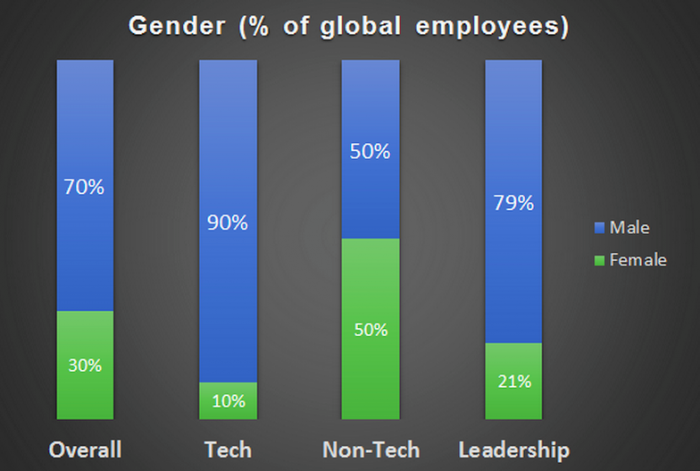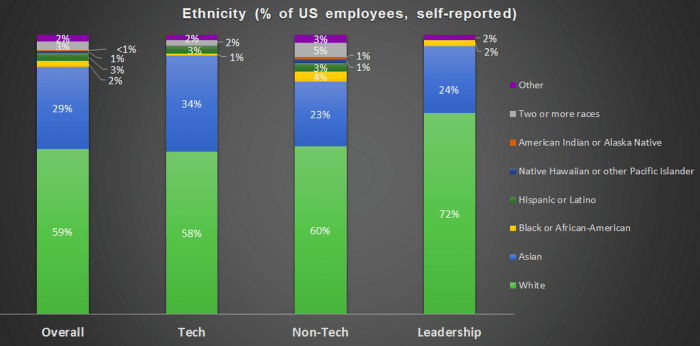A lack of employee diversity is a trending topic in Silicon Valley, and the data on Twitter’s racial and gender diversity, released Wednesday, further confirms what’s already become clear: male, white and Asian workers occupy the vast majority of tech jobs and leadership roles.
Ninety percent of Twitter’s global tech employees are male, while non-tech jobs are equally split by gender, according to data posted on Twitter’s blog by Janet Van Huysse, Vice President of Diversity of Inclusion. Additionally, men occupy 79% of leadership positions and comprise 70% of the total workforce. Here’s the breakdown:

When it comes to racial diversity, 88% of all Twitter employees and 92% of tech employees are either white or Asian (mostly white). And unlike gender diversity, Twitter’s non-tech roles similarly lack racial diversity: 83% are white or Asian (mostly white). In leadership, non-Asian minorities hold only 4% of leadership roles. Here are the full details:

Twitter’s statistics very much align with those released by other tech giants. In May, Google’s diversity report, the first of its kind from a major tech firm, spearheaded the diversity transparency movement that’s now gained traction across the U.S. Google reported that men were vastly overrepresented in tech jobs, while non-tech jobs had a roughly even gender split. Facebook’s report, LinkedIn’s report and Yahoo’s report also found similar results. But compared to all these companies, Twitter posts the highest proportion of male tech employees (90%) compared to Facebook (85%), Yahoo (85%), Google (83%) and LinkedIn (83%).
“We are keenly aware that Twitter is part of an industry that is marked by dramatic imbalances in diversity—and we are no exception,” writes Huysse, noting that Twitter has sponsored and partnered with several groups, like Girls Who Code and Girl Geek Dinners, that encourage women and underrepresented minorities to pursue careers in tech.
Twitter’s diversity report arrives roughly a month after the similar reports were made public, a delay that’s caused civil rights groups, including one led by Jesse Jackson, to petition Twitter to release its own statistics. Twitter and other companies are required to file the EEO-1 report to the federal government—LinkedIn went a step ahead and published its EEO-1—but there’s no such requirement that diversity data is released to the public. And though it may not a federal requirement, it certainly seems to be a social one, as companies like Twitter realize the value of a diverse workforce.
“By becoming more transparent with our employee data, open in dialogue throughout the company and rigorous in our recruiting, hiring and promotion practices, we are making diversity an important business issue for ourselves,” the blog states.
More Must-Reads from TIME
- Why Biden Dropped Out
- Ukraine’s Plan to Survive Trump
- The Rise of a New Kind of Parenting Guru
- The Chaos and Commotion of the RNC in Photos
- Why We All Have a Stake in Twisters’ Success
- 8 Eating Habits That Actually Improve Your Sleep
- Welcome to the Noah Lyles Olympics
- Get Our Paris Olympics Newsletter in Your Inbox
Contact us at letters@time.com